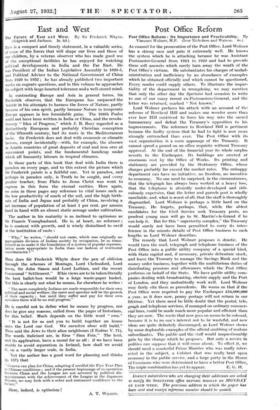Post Office Reform
Post Office Reform : Its Importance and Practicability. By Viscount Wolmer, M.P. (Ivor Nicholson and Watson. Os.)
As counsel for the prosecution of the Post Office, Lord Wolmer has a strong case and puts it extremely well. He knows the system which he is attacking because he was Assistant Postmaster-General from 192t to 1929 and had to provide these soft answers which rarely turn away the wrath of the Post Office's victims. He substantiates his charges of malad- ministration and inefficiency by an abundance of examples which he obtained officially and which cannot be questioned. Every reader could supply others. To illustrate the impar- tiality of the department in wrongdoing, we may mention that only the other day the Spectator had occasion to write to one of our many recent ex-Postmasters-General, and the letter was returned, marked Not known."
Lord Wolmer prefaces his attack with an account of the reforms of Rowland Hill and makes one wonder more than ever how Hill contrived to force his way into the sacred bureaucracy and defeat the Treasury's opposition to his improvements. The reference to Rowland Hill is pertinent because the faulty system that he had to fight is now more strongly entrenched than ever. The Post Office with its vast organization is a mere appanage of the Treasury. It .cannot spend a pound on an office requisite without Treasury approval. At the end of the financial year its whole surplus reverts to the Exchequer. Its buildings are erected at enormous cost by the Office of Works. Its printing and stationery are provided by the Stationery Office, whose charges probably far exceed the market rates. The unhappy department can have no initiative, no freedom, no incentive to economy. No one need be surprised, in the circumstances, that the telegraph has always been worked at a heavy loss, that the telephone is absurdly under-developed and ridi- culously expensive, that the letter and parcels post is wholly unreliable, and, what is worst of all, that the staff is thoroughly disgruntled. Lord Wolmer is perhaps a little hard on the Treasury. He forgets, perhaps, that, while the ablest candidates for the Civil Service seek Treasury posts, no prudent young man will go to St. Martin's-le-Grand if he can help it. But for this " superiority complex," the Treasury would surely not have been permitted to carry its inter- ference in the minute details of Post Office business to such lengths as Lord Wolmer describes.
The remedy that Lord Wolmer proposes is drastic. He would turn the mail, telegraph and telephone business of the Post Office into a public utility company of a special kind, with State capital and, if necessary, private debenture stock, and leave the Treasury to manage the Savings Bank and the money order business, together with the multifarious duties of distributing pensions and allowances which the Post Office performs on behalf of the State. We have public utility com- panies dealing with broadcasting, electric supply and the Port of London, and they undoubtedly work well. Lord Wolmer may fairly cite them as precedents. He warns us that if the Post Office were required to pay the Exchequer £10,000,000 a year, as it does now, penny postage will not return in our lifetime. Yet there need be little doubt that the postal, tele- graph and telephone services, if managed on ordinary commer- cial lines, could be made much more popular and efficient than they are now. The waste that now goes on seems to be colossal, because it is to no one's interest not to be wasteful, and new ideas are quite definitely discouraged, as Lord Wolmer shows by some deplorable examples of the official snubbing of zealous subordinates. The public and the staff would unquestionably' gain by the change which he proposes. But only a novice in polities can suppose that it will come about. To effect it, we should need a masterful Prime Minister who was really inter. ested in the subject, a Cabinet that was really bent upon economy in the public service, and a large party in the House of Commons who were determined to have a better Post Office.
The triple combination has yet to appear. E. G. H.


























 Previous page
Previous page